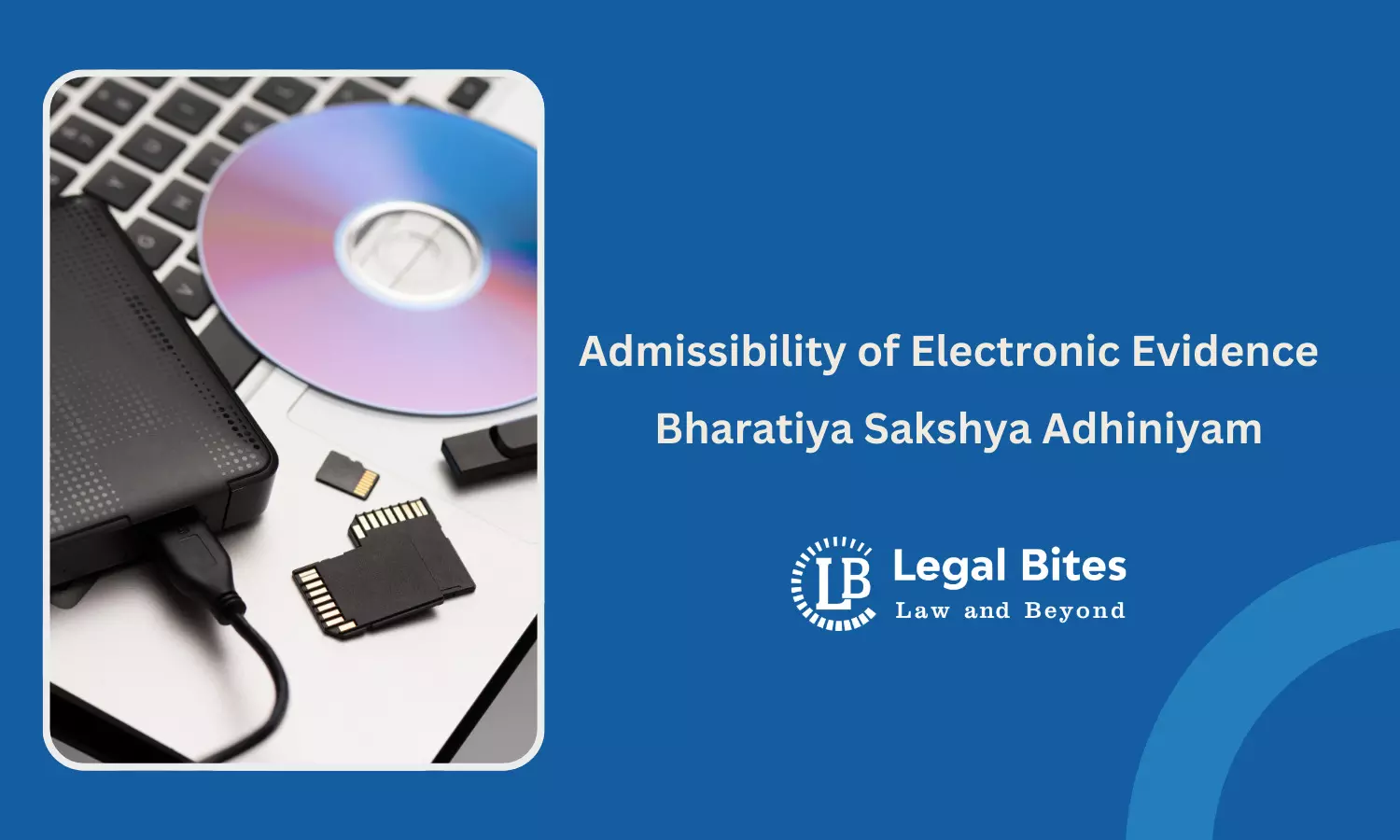Admissibility of Electronic Evidence under Bharatiya Sakshya Adhiniyam
This article examines the provisions of the Bharatiya Sakshya Adhiniyam, 2023, and analyzes its approach to electronic evidence.

The Bharatiya Sakshya Adhiniyam, 2023, marks a pivotal transformation in India's legal landscape, particularly concerning the admissibility of electronic evidence. As digital technologies permeate every facet of society, the legal system must adapt to effectively handle electronic records.
Introduction to Electronic Evidence
Electronic evidence encompasses any information generated, stored, or transmitted in digital form. This includes emails, digital documents, social media interactions, server logs, and other forms of digital data. The rise of digital communication and storage necessitates a robust legal framework to ensure such evidence is admissible and reliable in court proceedings.
Evolution from the Indian Evidence Act, 1872
Before the Bharatiya Sakshya Adhiniyam, 2023, the Indian Evidence Act, 1872, governed the admissibility of evidence, including electronic records. Sections 65A and 65B of the 1872 Act addressed electronic evidence, requiring a certificate to authenticate electronic records. However, ambiguities and challenges in interpreting these provisions often led to inconsistencies in judicial decisions.
Key Provisions of the Bharatiya Sakshya Adhiniyam, 2023
The Bharatiya Sakshya Adhiniyam, 2023, introduces several provisions to streamline the admissibility of electronic evidence:
Section 2(1)(e): Expands the definition of "evidence" to include electronic and digital records, recognizing them as documentary evidence.
Section 61: Ensures that electronic or digital records cannot be excluded from evidence solely due to their electronic form, granting them the same legal validity as traditional paper documents.
Section 63: Outlines the conditions under which electronic records are admissible, including the requirement for a certificate to authenticate their validity. This certificate must detail the process by which the electronic evidence was produced, ensuring its integrity and authenticity..
Under the Bharatiya Sakshya Adhiniyam, electronic records, including those printed on paper or stored in electronic formats (computer output), are deemed admissible as documents if specific conditions are met. These include regular use of the computer or device for lawful activities, proper functioning of the device, and the information being fed and reproduced accurately in the ordinary course of activities. Multiple devices used in a networked or standalone manner for such purposes are treated as a single entity. To admit such records as evidence, a certificate must accompany the electronic record, identifying it, describing its production, detailing the involved devices, and addressing the conditions of admissibility. The certificate must be signed by the person in charge and an expert, affirming its authenticity.
Schedule: Introduces a standardized format for the certificate required under Section 63, divided into Part A (to be completed by the party presenting the electronic records) and Part B (to be completed by an expert).
Admissibility Criteria for Electronic Evidence
For electronic evidence to be admissible under the Bharatiya Sakshya Adhiniyam, 2023, certain criteria must be met:
Authenticity: The evidence must be proven to be genuine and unaltered.
Relevance: The evidence should directly relate to the matter in question.
Reliability: The method of data collection and storage must be reliable, ensuring the evidence's integrity.
Compliance with Legal Procedures: The evidence must be obtained and presented in accordance with legal procedures, including the provision of necessary certifications.
Role of the Certificate under Section 63
The certificate under Section 63 serves as a crucial tool in authenticating electronic evidence. It must identify the electronic record, describe the manner of its production, and provide particulars of any device involved in its creation. The certificate should be signed by a person in charge of the computer or communication device and an expert, ensuring the evidence's credibility.
Judicial Interpretations and Precedents
The Indian judiciary has played a pivotal role in shaping the admissibility of electronic evidence. In Anvar P.V. v. P.K. Basheer (2014), the Supreme Court emphasized the necessity of a certificate under Section 65B of Indian Evidence Act for the admissibility of electronic records. This position was reaffirmed in Arjun Panditrao Khotkar v. Kailash Kushanrao Gorantyal (2020), where the Court clarified that the certificate is a condition precedent to the admissibility of electronic evidence.
These cases collectively demonstrate the judiciary’s evolving interpretation of electronic evidence under the IEA and provide a foundation for understanding how the Bharatiya Sakshya Adhiniyam builds upon these principles to ensure the reliable and consistent treatment of digital evidence in Indian courts.
Challenges in Admitting Electronic Evidence
Despite the advancements, several challenges persist in admitting electronic evidence:
Technical Complexity: Understanding and interpreting digital data requires technical expertise, which may be lacking in legal settings.
Data Integrity: Ensuring that electronic evidence has not been tampered with is crucial, necessitating robust mechanisms for verification.
Privacy Concerns: The collection and presentation of electronic evidence must balance the need for information with individuals' privacy rights.
Conclusion
The Bharatiya Sakshya Adhiniyam, 2023, marks a significant step forward in integrating electronic evidence into India's legal system. By addressing the unique challenges posed by digital data, the Act ensures that electronic records are admissible, reliable, and accorded the same legal standing as traditional forms of evidence. As technology continues to evolve, the legal framework must adapt to ensure justice is served in the digital age.
References
[1] Bharatiya Sakshya Adhiniyam, 2023
[2] Anvar P.V. v. P.K. Basheer, (2014) 10 SCC 473.
[3] Arjun Panditrao Khotkar v. Kailash Kushanrao Gorantyal, (2020) 7 SCC 1.
[4] Electronic Evidence under Bharatiya Sakshya Adhiniyam, 2023, Available Here
[5] Requirements of Admissibility of Electronic Evidence Under Bhartiya Sakshay Adhiniyam 2023, Available Here
[6] Admissibility of Electronic Evidence Under Bhartiya Sakshay Adhiniyam 2023, Available Here

